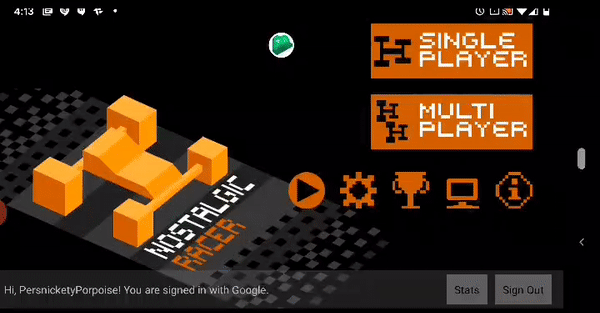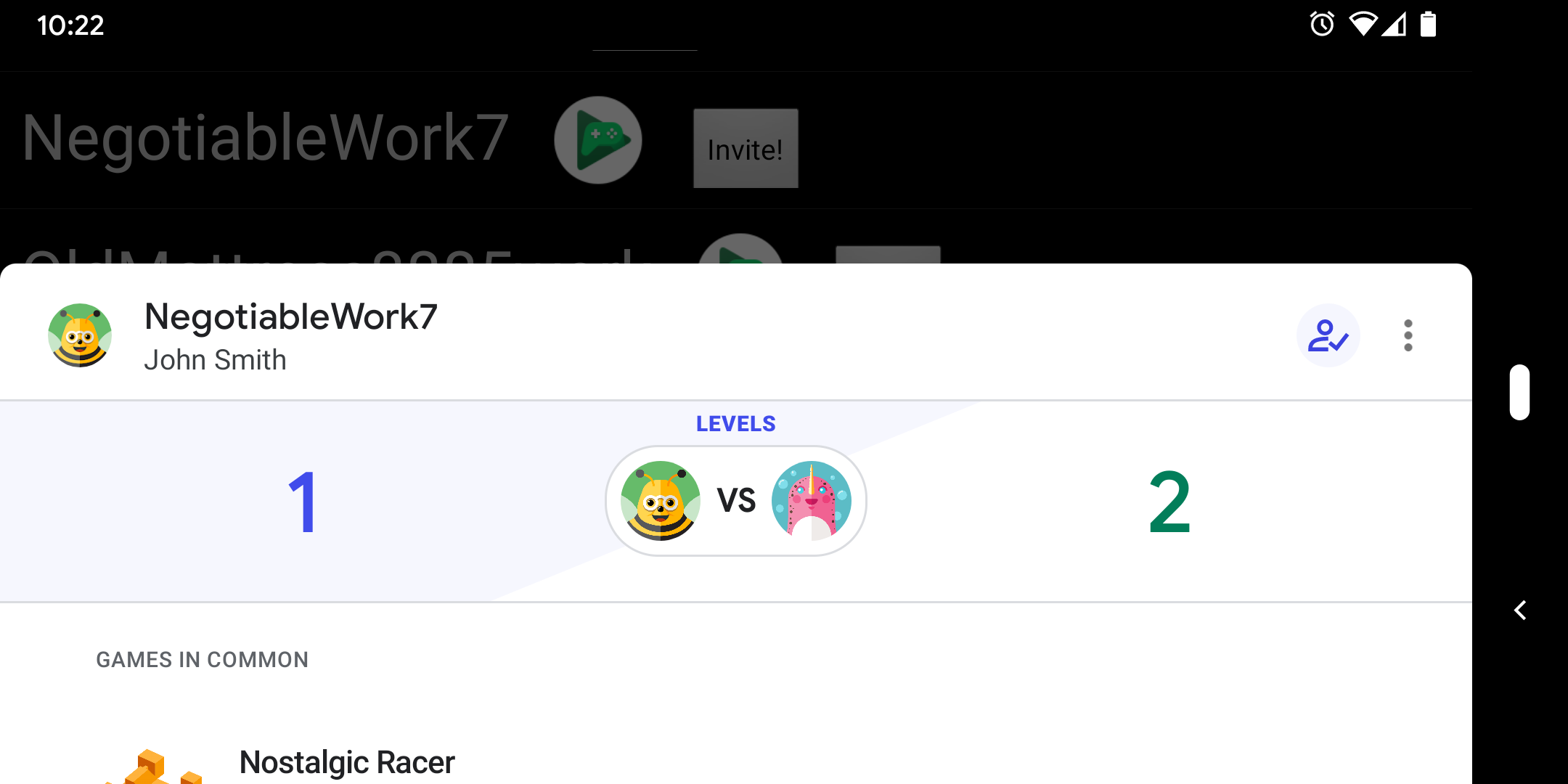ใช้ Friends API เพื่อเสริมและปรับปรุงระบบเพื่อนในเกมที่มีอยู่ ตลอดจนระบบโซเชียลอื่นๆ ที่เกมของคุณอาจเข้าถึง ซึ่งจะช่วยให้ผู้เล่นทำสิ่งต่อไปนี้ได้
ค้นหาเพื่อนของตนในเกมของคุณ
เปรียบเทียบคะแนนกับเพื่อนๆ ในลีดเดอร์บอร์ด
นำรายชื่อเพื่อนใน Play Games มารวมเข้ากับรายชื่อเพื่อนที่มีอยู่แล้วในเกม
ระบุตัวตนผู้เล่นคนอื่นด้วยป๊อปอัปโปรไฟล์ในเกม ป๊อปอัปนี้จะแสดงชื่อเล่นที่ผู้เล่นปัจจุบันตั้งให้เพื่อน เพื่อให้รู้ว่ากำลังเล่นกับใคร

ข้อมูลเบื้องต้น
API เหล่านี้ช่วยให้คุณทำสิ่งต่อไปนี้ได้
- โหลดเพื่อน: คุณสามารถตรวจสอบได้ว่าผู้เล่นอนุญาตให้เกมเข้าถึงข้อมูลรายชื่อเพื่อนหรือไม่ หากได้รับสิทธิ์เข้าถึง คุณจะดูรายการออบเจ็กต์ผู้เล่นที่สอดคล้องกับเพื่อนของผู้เล่นที่ได้รับการตรวจสอบสิทธิ์ได้
- เปิดมุมมองโปรไฟล์ Play Games ของผู้เล่นคนอื่น: คุณสามารถเปิดมุมมองนี้เพื่อแสดงชื่อที่ผู้เล่นที่ผ่านการตรวจสอบสิทธิ์ตั้งให้กับผู้เล่นคนอื่นได้ มุมมองนี้ยังมีตัวควบคุมการจัดการความเป็นเพื่อนและจะไม่นำผู้เล่นออกจากเกม
- ให้สิทธิ์ควบคุมแก่ผู้ใช้: ผู้ใช้มีสิทธิ์ควบคุมในการจัดการวิธีที่เพื่อนจะเห็นโปรไฟล์ Play Games ของตน และวิธีแสดงรายชื่อเพื่อนของตนในเกมต่างๆ สำหรับการเข้าถึงรายชื่อเพื่อน ผู้ใช้สามารถเลือกอนุญาตให้เกมทั้งหมดเข้าถึงรายชื่อเพื่อนโดยอัตโนมัติ หรือเลือกอนุญาตในแต่ละเกมแยกกันก็ได้ ดังนั้น เมื่อโหลดรายชื่อเพื่อน ผลลัพธ์อาจเป็นการเรียกกลับเพื่อแสดงคำขอเข้าถึง
นำเข้ารายชื่อเพื่อนใน Play Games
คุณใช้ Friends API เพื่อดูรายชื่อเพื่อนใน Play Games ของผู้เล่น และเพิ่มเพื่อนเหล่านั้นลงในรายชื่อเพื่อนในเกมได้
ผู้ใช้ใหม่จะมีรายชื่อเพื่อนเริ่มต้นให้เล่นด้วย และผู้ใช้เดิมจะนำเข้าเพื่อนใน Play Games ไปยังรายชื่อเพื่อนในเกมได้ ด้วยเหตุนี้ ผู้ใช้จึงมีกลุ่มผู้เล่นที่ใหญ่ที่สุดเท่าที่จะเป็นไปได้ให้เล่นหรือแข่งขันด้วย
เพิ่มเพื่อนใน Play Games ลงในเกม
เพิ่มเพื่อนใน Play Games ลงในรายชื่อเพื่อนในเกมที่มีอยู่โดยเชื่อมโยงรหัส Play Games กับข้อมูลผู้เล่นที่เกี่ยวข้องในฐานข้อมูลภายในของคุณ ตรวจสอบว่าคุณมีปุ่มที่มีไอคอน Play Games อยู่ข้างเพื่อนเหล่านี้ ซึ่งจะแสดงโปรไฟล์ของผู้เล่นคนอื่นเมื่อกด เพื่อให้ผู้ใช้ทราบว่าเพื่อนคือใคร
เมื่อใช้รายชื่อเพื่อนจากเซิร์ฟเวอร์แบ็กเอนด์ ให้โหลดอย่างปลอดภัย
โดยใช้ REST API แทนการส่งผลลัพธ์ของ Android API โปรดใช้รหัสผู้เล่นที่ players.get(me)
แสดงใน REST API สำหรับผู้เล่นที่ได้รับการตรวจสอบสิทธิ์ในปัจจุบัน เนื่องจากรหัสนี้จะสอดคล้องกับรหัสที่ผู้เล่นคนอื่นๆ เห็น
หากไม่ได้จัดเก็บรายชื่อเพื่อนที่เพิ่ม (แต่ใช้เฉพาะในเวลาที่ดู) ก็ไม่จำเป็นต้องดำเนินการใดๆ เพิ่มเติม
ให้สิทธิ์เข้าถึง Play Games
หากเกมยังไม่มีสิทธิ์เข้าถึง Play Games เวลาที่เหมาะสมในการขอความยินยอมจากผู้ใช้คือตอนที่ผู้ใช้ดูรายชื่อเพื่อนในเกม ตัวอย่างเช่น คุณอาจเพิ่มปุ่มที่ชื่อนำเข้าเพื่อนใน Play Games ซึ่งจะแจ้งให้ผู้ใช้ให้ความยินยอมเมื่อแตะ (โปรดตรวจสอบว่าใช้โลโก้ Play Games บนปุ่มที่กล่าวถึงบริการ)
ดูโปรไฟล์ของผู้เล่นคนอื่น
คุณอนุญาตให้ผู้เล่นที่ได้รับการตรวจสอบสิทธิ์ดูโปรไฟล์ Play Games ของผู้เล่นคนอื่นได้ ซึ่งจะช่วยให้ผู้เล่นที่ได้รับการตรวจสอบสิทธิ์เห็นชื่อที่ตั้งให้ผู้เล่นคนอื่น รวมถึงดูว่าเป็นเพื่อนกันอยู่แล้วหรือไม่ ซึ่งจะช่วยให้ผู้เล่นทราบบริบทเพิ่มเติมเกี่ยวกับความสัมพันธ์ หากผู้เล่นยังไม่ได้เป็นเพื่อนกัน ผู้เล่นที่ได้รับการตรวจสอบสิทธิ์จะเห็นตัวควบคุมการจัดการความเป็นเพื่อนในมุมมองโปรไฟล์ เมื่อสร้างความเป็นเพื่อนจากภายในเกม ชื่อเริ่มต้นสำหรับผู้เล่นทั้ง 2 คนจะเป็นชื่อในเกม (หากระบุไว้) ระบบจะแสดงชื่อเกมที่เริ่มต้นความเป็นเพื่อนด้วย

ลีดเดอร์บอร์ดโซเชียล
สามารถใช้ Friends API สำหรับลีดเดอร์บอร์ดได้ด้วย ใช้ฟีเจอร์นี้เพื่อแสดงอันดับของผู้เล่นปัจจุบันในกลุ่มเพื่อนใน Play Games โปรดทราบว่าข้อมูลนี้ใช้ได้กับผู้ใช้ที่เลือกแชร์ข้อมูลนี้กับแอปพลิเคชันของคุณเท่านั้น
และผู้ใช้ต้องเป็นเพื่อนกันใน Play Games เกมจะแสดงตัวควบคุมต่อผู้ใช้เพื่อรองรับฟีเจอร์นี้ การควบคุมนี้ใช้อาร์กิวเมนต์
collection เพื่อเลือกมุมมองโซเชียลของลีดเดอร์บอร์ด ดูข้อมูลเพิ่มเติมได้ที่ส่วนลีดเดอร์บอร์ดสาธารณะและโซเชียล
หากคุณใช้การรวบรวมลีดเดอร์บอร์ดโซเชียล การเรียกเพื่อโหลดคะแนนลีดเดอร์บอร์ดอาจแสดงข้อผิดพลาดที่ต้องอาศัยการยินยอมในการแก้ไขซึ่งคล้ายกับที่ได้จาก loadFriends()
หากคุณใช้ UI เริ่มต้นที่ Play Games มีให้ (เช่น
getLeaderboardIntent())
ระบบจะจัดการให้คุณโดยอัตโนมัติ
ขั้นตอนถัดไป
ก่อนเริ่มใช้ Friends API ให้ทำดังนี้
- ดาวน์โหลดและตรวจสอบตัวอย่างโค้ดโดยทำดังนี้
- ทำความคุ้นเคยกับคำแนะนำที่อธิบายไว้ในรายการตรวจสอบคุณภาพ
- ใช้ Friends API ในไคลเอ็นต์ Java
